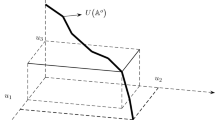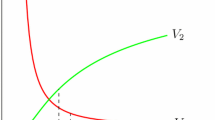Abstract
This note proves that the two person Nash bargaining theory with polyhedral bargaining regions needs only an ordered field (which always includes the rational number field) as its scalar field. The existence of the Nash bargaining solution is the main part of this result and the axiomatic characterization can be proved in the standard way with slight modifications. We prove the existence by giving a finite algorithm to calculate the Nash solution for a polyhedral bargaining problem, whose speed is of orderBm(m-1) (m is the number of extreme points andB is determined by the extreme points).
Similar content being viewed by others
References
Dantzig GB (1956) Constructive Proof of the Min-Max Theorem. Pacific J Math 3, 25–33
Herstein IN, Milnor J (1953) An Axiomatic Approach to Measurable Utility. Econometrica 21, 291–297
Kuhn HW (1961) An Algorithm for Equilibrium Points in Bimatrix Games. Proc Nat Acad Science USA 7, 1657–1662
Mendelson E (1973) Number Systems and the Foundation of Analysis. Academic Press
Nash JF (1950) The Bargaining Problem. Econometrica 18, 155–162
Parthasarathy T, Raghavan TES (1981) An Ordered Field Property for Stochastic Games when one Player Controls Transition Probabilities. Journal of Optimization Theory and Applications 33, 375–392
Roth AE (1979) Axiomatic Models of Bargaining. Lecture Notes in Economics and Mathematical Systems No. 170. Springer-Verlag
Owen G (1968) Game Theory. W. B. Saunders Company
Shapley LS (1953) Stochastic Games. Proc Nat Acad Science USA 39, 1095–1100
Vrieze OJ, Tijs SH, Raghavan TES, Filar JA (1983) A Finite Algorithm for the Switching Control Stochastic Game. Operations Research 5, 15–24
Vorob'ev NN (1958) Equilibrium Points in Bimatrix Games. Theory of Probability and Applications 3, 293–309
Weyl H (1950) Elementary Proof of a Minimax Theorem due to Von Neumann. Contributions to the Theory of Games I. Annals of Mathematics Studies 24, 19–25
Author information
Authors and Affiliations
Additional information
The author thanks Takashi Nagashima of Hitotsubashi University for valuable suggestions on this subject.
Rights and permissions
About this article
Cite this article
Kaneko, M. The ordered field property and a finite algorithm for the Nash bargaining solution. Int J Game Theory 20, 227–236 (1992). https://doi.org/10.1007/BF01253777
Received:
Issue Date:
DOI: https://doi.org/10.1007/BF01253777




